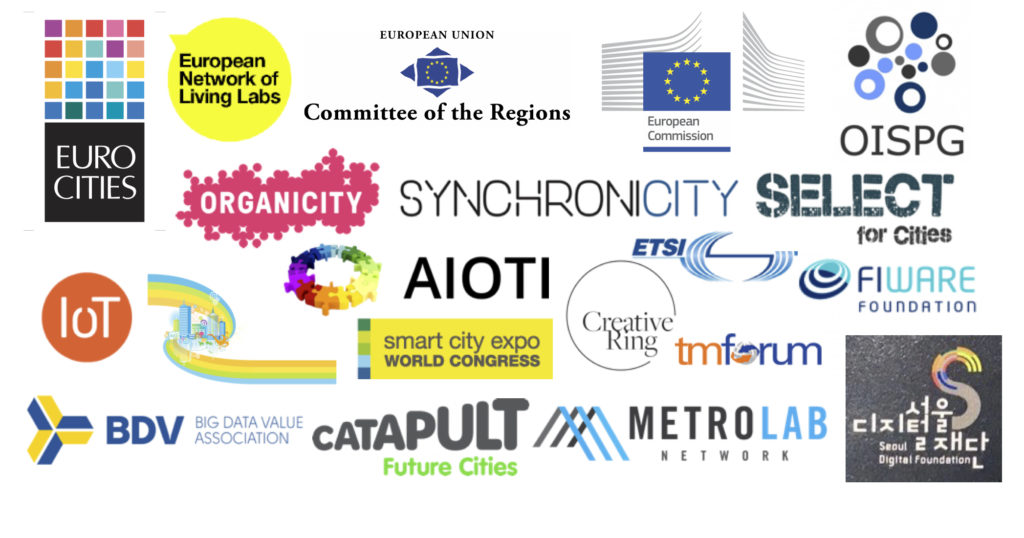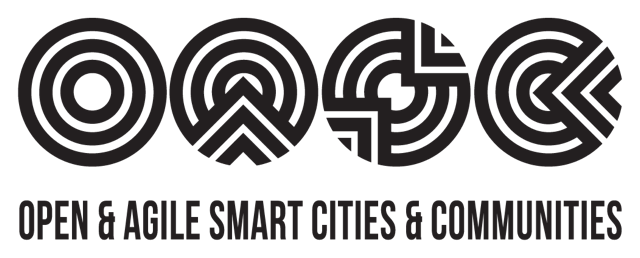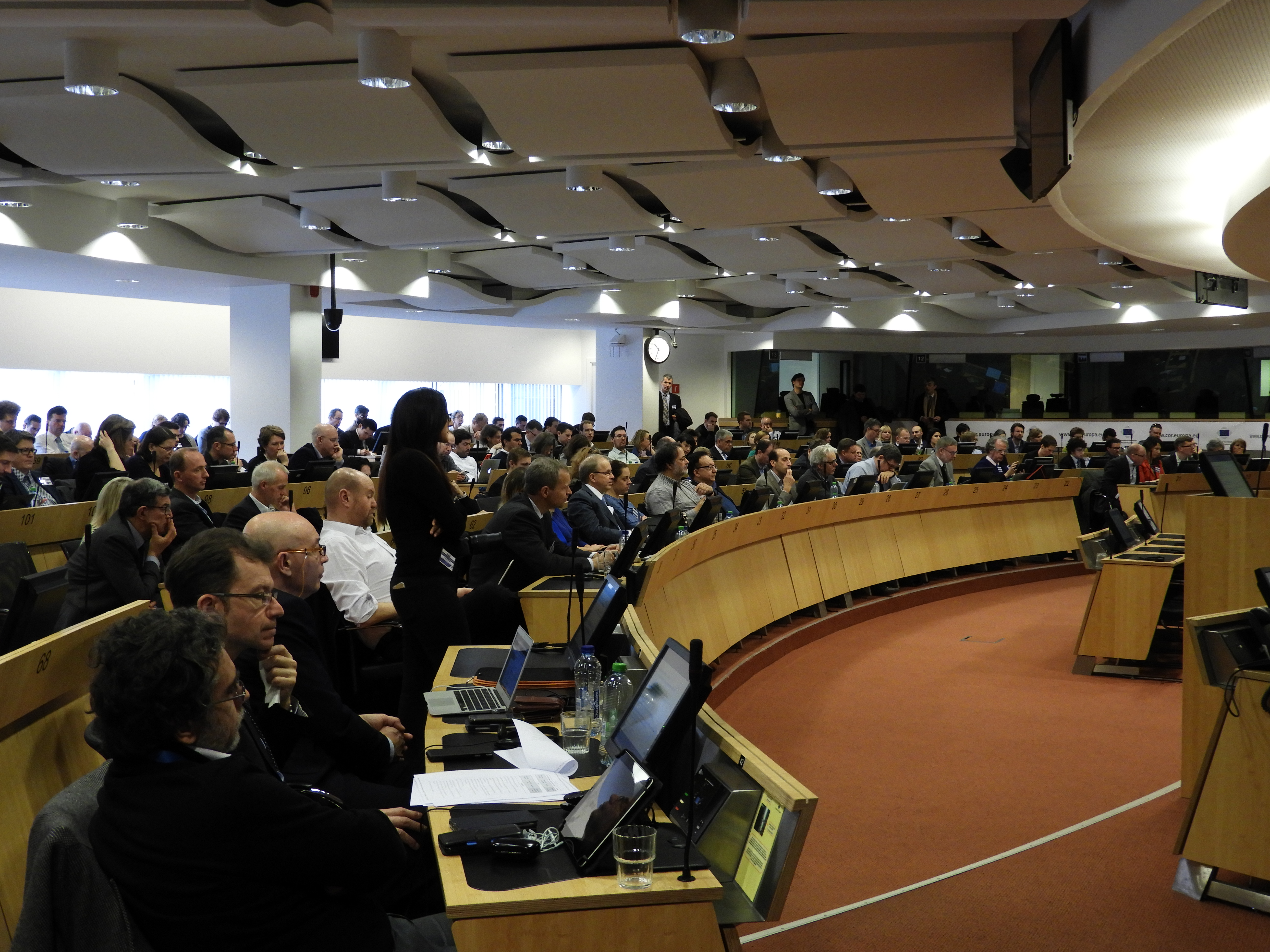The Connected Smart Cities Conference 2017 took place on January 12 in Brussels.
Slides, session reports and videos are now available directly in the programme below.
With 370 registered from 32 different countries, the 4th installment of the conference brought together the Open & Agile Smart Cities community to attend and learn from the keynote speakers and eight parallel sessions. Below you will find the full programme of the day, along with directly linked documentation of the two plenary and eight parallel sessions.
Experience the conference thorugh the lense of social media, photos and key messages in the Storify, which captures the day in a more narrative format.
The exact dates for next year’s Connected Smart Cities Conference in January 2018 will also be published soon.
Video is available for the morning opening and high-level keynote, the Innovation and Ecosystems and Cities for and by Citizens sessions and for the afternoon high-level keynote and closing note.
Programme
8:30–9:00 Registration and morning coffee
9:00–9:15 Plenary: Welcome from the Chair, Dr. Martin Brynskov, Open & Agile Smart Cities [ video ]
- Moderator for the day: Jarmo Eskelinen, Future Cities Catapult
9:15–10:00 Plenary: High-level keynotes [ video: from 00:13:30 ]
- Markku Markkula, President of the European Committee of the Regions
- Günther H. Oettinger, Member of the European Commission [ video address ]
- Mary-Ann Schreurs, Vice-Mayor of innovation, culture, design and sustainability for the City of Eindhoven, and Chair of EUROCITIES Knowledge Society Forum
- Anna-Kaisa Ikonen, Mayor of Tampere, Finland [ slides ]
- Kees van der Klauw, Chair of the Alliance for IoT Innovation, Philips Lighting [ slides ]
- Rapporteur: Judith Stiekema, Olha Bondarenko & Wim De Kinderen [ session report ]
10:00–10:15 Coffee break
10:15–12:15 Parallel sessions 1
- Innovation ecosystems – Chairs: Gohar Sargsyan, OISPG, CGI & Zsuzsanna Bodi, ENoLL
- Market creation & policy issues – Chair: Hugo Goncalves, Forum Virium Helsinki
- Mobility – Chair: Seppo Haataja, City of Tampere/OASC
- Platforms & data models – Chair: Jarmo Eskelinen, Future Cities Catapult
12:30–13:30 Networking Lunch
13:30–15:30 Parallel sessions 2
- Cities by and for people – Chair: Marita Holst, Lulea Technical University
- Assisted living & aging – Chairs: Sergio Guillen & Giureppe Fico, Universidad Politécnica de Madrid
- Digital Water – Chairs: Durk Krol & Andrea Rubini, WSSTP
- Standards for real-time urban services – Chair: Catherine Mulligan, Imperial College London/OASC
15:30–16:00 Coffee break
16:00–16:30 Plenary: Results from the parallel sessions [ video: from 02:39:30 ]
16:30–17:00 Plenary: Final keynote speeches and closing of the conference [ video: from 03:02:15 ]
- Ben Levine, Executive Director of MetroLab Network, USA
- Chi-Hyung Lee, President, Seoul Digital Foundation, Republic of Korea [ slides ]
- Alberto Martin Torras, Smart City Expo
- Nikolaos Isaris, Deputy Head of Unit, Internet of Things, DG CONNECT, European Commission
- [ session report ]
17:00 Networking Reception
18:30 End
Details on the parallel sessions
3 cross-cutting themes, 3 domain-specific sessions, 2 technical sessions.
Cross-cutting themes:
- Innovation Ecosystems: Open innovation between small and large, public and private
- Market Creation & Policy Issues: On market creation
- Cities for and by People: Co-creation, ethics & privacy
Domain-specific:
- Mobility: As the recent OASC survey shows, mobility is a dominant aspect in any major smart city strategy
- Digital Water: Water management is one of the biggest existing deployments of sensors in urban areas
- Assisted Living & Aging: Focus on living environments for elderly and disabled citizens
Technical track:
- Platforms & Data Models: Emerging mechanisms for interoperability
- Standardisation: Connecting cities to ongoing initiatives
Morning Panel Sessions
Innovation Ecosystems: Open innovation between small and large, public and private
[ video: from 01:33:00 | video: continued | video: until 00:11:30 ]
Innovation Ecosystems session demonstrates an approach which is cities and citizen driven and backed by industry. Ultimate goals are the commercialization and market creation based on cities and citizens’ needs. The session aims to proof that innovation ecosystems can be valid mechanisms for creation of cities enablement platforms with simple standards for interoperability and near real data exchange from connected cities. Since IoT is becoming central to modern smart cities, special focus will be given to IoT for cities and citizens.
Chairs: Zsuzsanna Bodi and Gohar Sargsyan [ slides 1 | slides 2 ]
Speakers: Davor Meersman, Louise Overgaard [ slides ], Auke van den Hoek [ slides ], Ingrid Willems [ slides ] and Nicolas Walder [ slides ]
For group discussions:
Lead Experts: Dimitri Schuurman, Wim de Kinderen, Marita Holst, Yilmaz Cakir and Jose Quadrio Alves
Rapporteur: Zsuzsanna Bodi & Katariina Malmberg [ session report ]
Additional information on this panel session can be found here.
Market Creation & Policy Issues: On market creation
With the strain on cities due to the global population shift from rural to urban areas, and a variety of economical and societal grand challenges, Smart Cities and the Internet of Things have the potential to revolutionize urban infrastructure, making cities less congested, less polluted, more energy-efficient and enhance citizens’ health and quality of life. The vision of the Open & Agile Smart Cities (OASC) initiative is to create an open smart city market based on the needs of cities and communities. The ‘Market Creation & Policy Issues’ session brings the OASC community together, presenting concrete examples of how to support, develop and scale up innovative digital services. They showcase a variety of approaches to support entrepreneurship and to drive the digital economy.
Goals
– To spread knowledge and best practice, see concrete successful examples from OASC and related members;
– To formulate new paths for future concrete collaboration within the OASC and beyond.
Chair: Hugo Gonçalves [ slides ]
Speakers: Katalin Gallyas [ slides ], Carl Piva [ slides ], Martin Brynskov [ slides ], Hanna Niemi-Hugaerts [ slides ], Jakob Møller Nielsen [ slides ], Ann Fournier [ slides ] & Koen Snoeckx [ slides ]
Rapporteurs: Roope Ritvos & Hugo Gonçalves [ session report ]
Mobility: Mobility is a dominant aspect in any major smart city strategy
Chair: Seppo Haataja [ slides ]
Speakers: Pieter Morlion [ slides | article ], Margarida Campolargo [ slides ], Jukka Lintusaari [ slides ], Lauri Uski [ slides ] and Paul Kompfner [ slides ]
Rapporteur: Seppo Haataja [ session report ]
Platforms & Data Models: Emerging mechanisms for interoperability
Smart cities have been a promising concept for over a decade. Despite the efforts and investments of major cities and companies, the current market place remains broken. One city is not a market. Urban services are too often bespoke solutions, and cities can’t benefit from the economics of scale, harmonisation of technologies, open standards and shared practices would provide. On the other hand, cities are – for a reason – wary about the risks of a technology lock-in, being locked in the solution of one provider with a “one platform to rule them all” solution.
Chair: Jarmo Eskelinen
Speakers: Ovidiu Vermesan, Svet Mihaylov (EC, H2) [ slides ], Bart Rosseau (Ghent), Juanjo Hierro, Martin Serrano (INSIGHT), Jamie Cudden (Dublin), Thimo Thoeye (DataLab) and Darren Panbourne (FutureCitiesCatapult)
Afternoon Panel Session
Cities for and by People: Co-creation, ethics & privacy
[ video: 00:09:30-02:15:40 ]
Both Open and Big data have become part and parcel of our times. Today, data has a huge impact in our lives and it often makes our lives easier. The use of technology and the subsequent generation and utilization of digital data have become ubiquitous, virtually taken for granted. The impact of these technologies is evolving continuously with the creation of new content, connectivity, analysis vetoftware and infrastructure. Adding to this, we can observe a radical trend towards networked behavior such as crowdsourcing and co-creation, driven by (among others) the emergence of the open-source software community, the general use of social networks and increased availability of data. The potential opportunities to engage people in innovation process have never been easier as a plethora of digital resources can be used as facilitators of the process.
However, there is a growing trend to view data as the new oil or as gold mines consisting of wealth if we only understand how to harvest the data in the right way. In smart cities, big data are generated by e.g. sensors, social media flows, open government data, citizen data and GPS trackers. But with a strong focus on the generation, collection and analysis of data, there is a growing risk that we humans will be viewed mainly as data providers and data generators. This can lead to a situation where people’s privacy, their needs and values comes second after the expected value data can offer for companies and cities. In this session we will present and discuss a few examples from real experience and also argue that the endeavor is to co-create digital innovations with people and their needs at the center.
Chair: Marita Holst [ slides ]
Speakers: Benjamin Aaron Snow [ slides ], Belen Palacios [ slides ], Anna Ståhlbröst [ slides 1 | slides 2 ] and Luca Bolognini [ slides ]
Rapporteur: Lina Christensen [ session report ]
Digital Water: Water management is one of the biggest existing deployments of sensors in urban areas
By 2025, an estimated two thirds of the world’s population will live in water stressed regions. Water availability is already under pressure across Europe, with one fifth of Europe’s population living in countries where the total water abstraction puts pressure on water resources. With water being such a critical resource, water and water infrastructures need to be managed effectively particularly in urban areas.
To solve water management challenges, providers should consider a systemic approach that combines data from assets and external sources, with predictive analytics working on reliable digital platforms.
Connecting the assets into a real-time monitoring network will reduce the amount of time it takes to detect leaks, service disruptions, water quality concerns and enable utilities to fix problems more quickly, reduce unpredicted failures and damages. Using this data, predictive analytics can recognise and update operators of possible problems in advance so that well-timed maintenance can be implemented to prevent problems from occurring.
Technology and digital thinking are already making an impact and brought promising technologies like smart meters, high-tech leak detection devices and water data software to market. But still efforts to use digital technology and software to solve water management challenges are required.
The Digital Water Parallel Session intends to make a coordinated aggregated effort from EU Institutions, cities, utilities and the public/private sectors to outline a perspective for a workable development of digital technology towards the sustainable management of water.
Chair: Andrea Rubini [ slides ]
Speakers: Panagiotis Balabanis, Jakob Møller Nielsen [ slides ], Joan Carles Guardiola, Jesper Kjelds [ slides ], Olavi Luotonen [ slides ], Juergen Sturm and Montserat Mussons Olivella [ slides ]
Rapporteur: Durk Krol & Andrea Rubini [ session report ]
Additional information on this panel session can be found here.
Assisted Living & Aging: Focus on living environments for elderly and disabled citizens
Chairs: Sergio Guillen [ slides ] and Giuseppe Fico
Speakers: Ian Spero, Andrew Bleaden [ slides ] and Allan Nordby Ottesen [ slides ]
Standardisation: Connecting cities to ongoing initiatives
Standards are a critical part of the developing the Smart Cities market – they reduce vendor lock-in for cities, while creating market certainty for the companies in question. In order to create a flourishing smart city market, cities need to work together to create economies of scale through standards that are of direct benefit to them and their citizens. This session covers critical aspects of smart city standards from a variety of viewpoints – including cities, Standard Development Organisations (SDOs), Researchers and companies. This panel debate will provide insight into the cutting-edge developments within this space, including the latest research projects within Europe, the Alliance for Internet of Things Innovation (AIOTI) WG03 and the newly formed Industry Specification Group (ISG) within ETSI working on Context Information Management (CIM). The panel will discuss the best practices for cities to engage with standards and also be seeking participation from the audience in a broader discussion of how cities can contribute their requirements effectively to the ongoing standards efforts.
Chair: Catherine Mulligan
Speakers: Christophe Colinet [ slides ], Patrick Guillemin [ slides ], Lindsay Frost [ slides ], Emmanuel Darmois [ slides ], Nikolaos Kontinakis [ slides ], Bart De Lathouwer, Sébastian Ziegler and Miimu Airaksinen [ slides ]
The Connected Smart Cities Conference is organised by Open & Agile Smart Cities (OASC), produced by OASC and the European Network of Living Labs (ENoLL), kindly hosted by the European Committee of the Regions, with contributions from the following organisations and related projects (alphabetically): Alliance for IoT Innovation (AIOTI), Big Data Value Association (BDVA), Creative Ring, EUROCITIES, European Commission, European Innovation Partnership on Smart Cities and Communities (EIP-SCC), European Telecommunications Standards Institute (ETSI), European Platforms Initiative on IoT (IoT-EPI), FIWARE Foundation, Future Cities Catapult, MetroLab Network, Open Innovation Strategy & Policy Group (OISPG), OrganiCity, SELECT for Cities, Seoul Digital Foundation, Smart City Expo and SynchroniCity.


